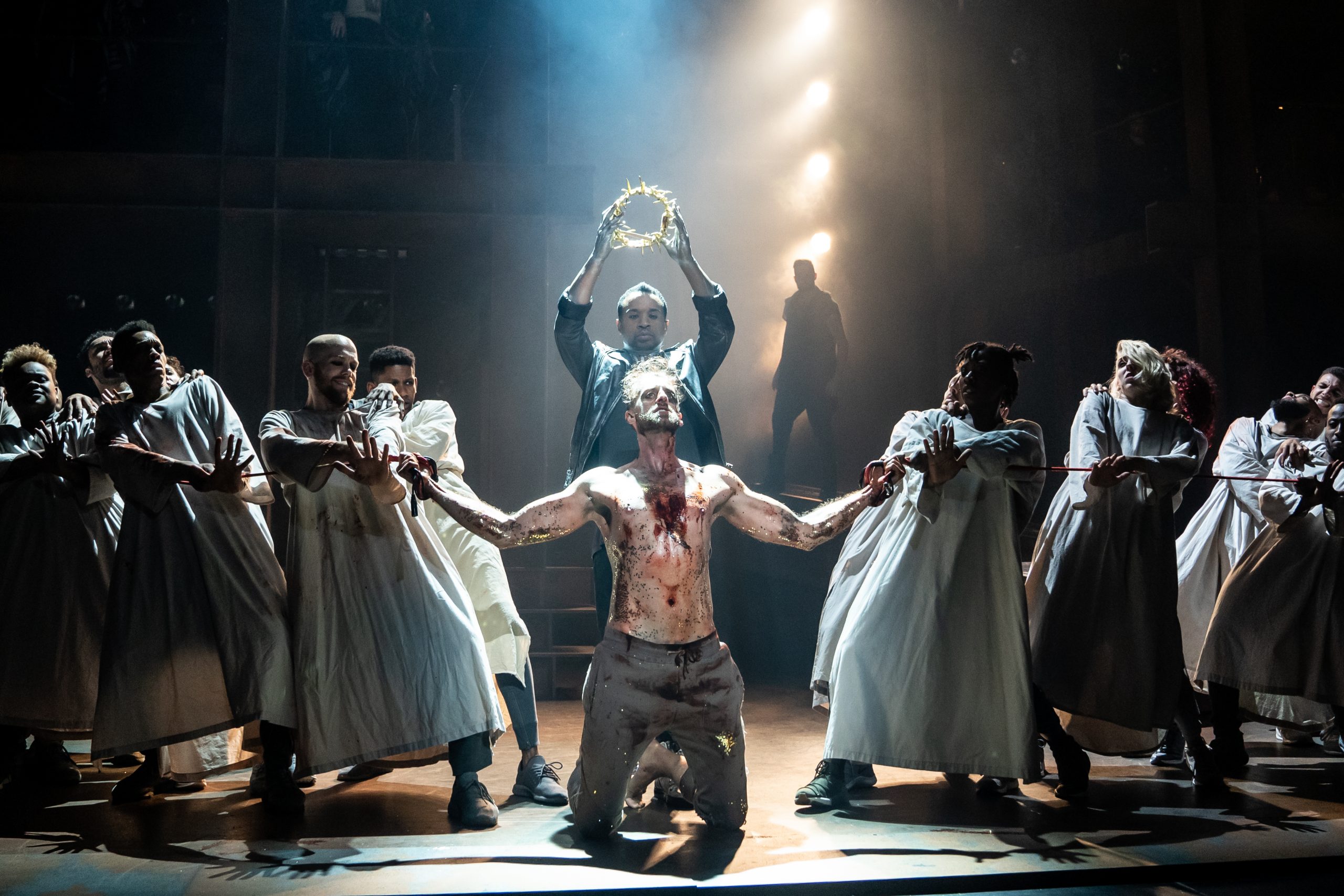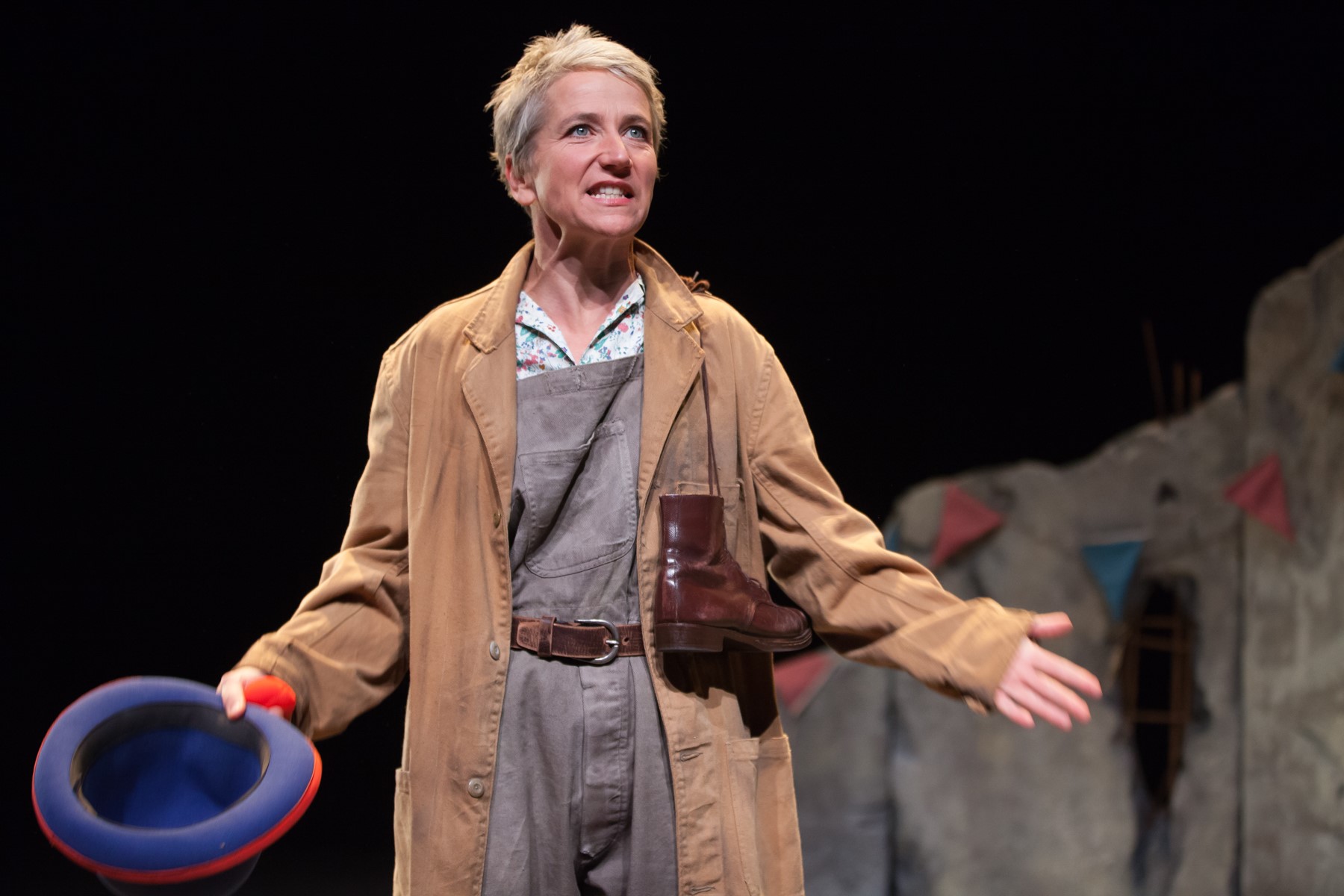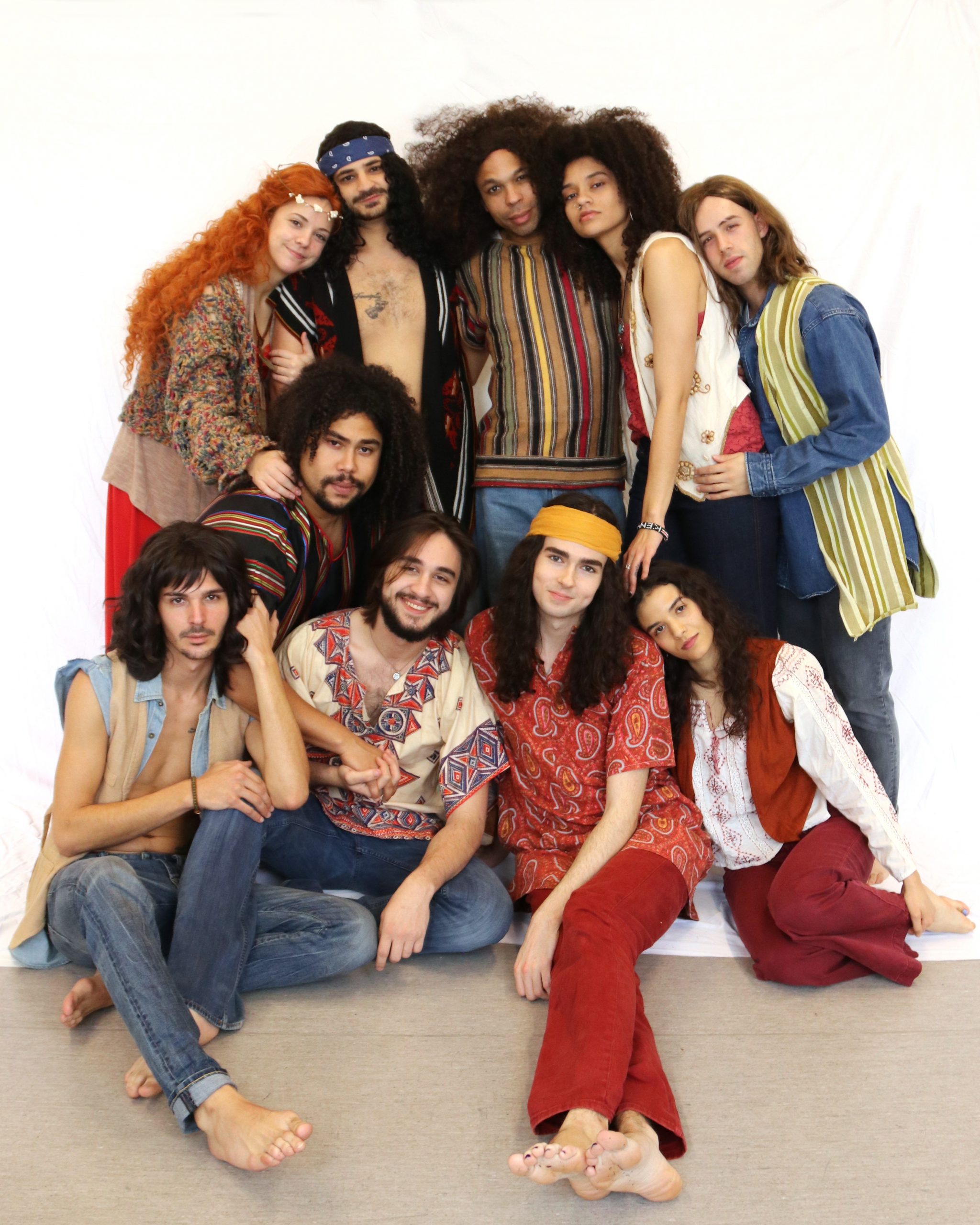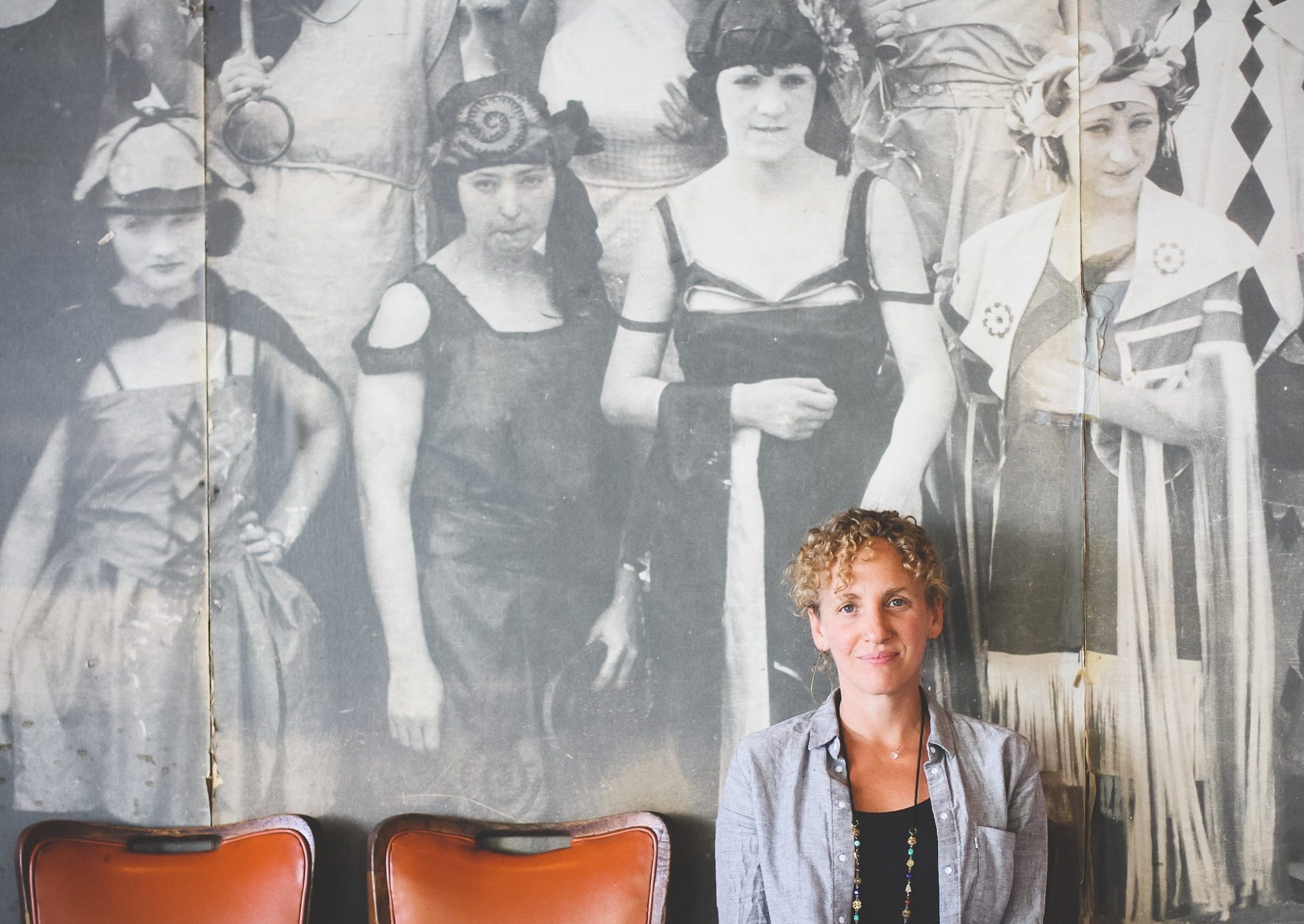January Theater Guide: Midwinter Musicals Set the Tone

The touring production of ‘Jesus Christ Superstar’ leads off a notable series of music-related shows taking Pittsburgh theater into the new year. (photo: Matthew Murphy)
January is a lean month in Pittsburgh theater, but this year the quality of choices makes up for the lack of quantity. The interesting-ness quotient is high and there’s hardly a ho-hum show on the schedule.
Three musicals stand out, none of them new, but each historically significant and still—what’s the word? Relevant? Enjoyable? Probably a couple of words in that ballpark. Hair brought experimental theater concepts to the musical stage in the 1960s. Jesus Christ Superstar put Jesus himself on stage along with Judas, in dueling lead roles. Little Shop of Horrors demonstrates how a dark-comic musical can be absurd and yet compelling.
As for so-called straight plays, which by the way aren’t only for straight people: Downstairs is the new psychothriller from Theresa Rebeck, winner of an Edgar Allan Poe Award for that sort of writing. An Elephant in the Garden, based on a book by the author of War Horse, tells a war story as seen through the eyes of civilian refugees.
Two prestigious (and contrasting) dance companies visit in January. The National Ballet Theatre of Odessa, now on its first U.S. tour, dances Swan Lake at Greensburg’s Palace Theatre, while new-wave tap dancer Sarah Reich brings her traveling entourage to the Cultural District. Also on tap is a one-person theater piece with music, singer/songwriter Natalia Zukerman’s The Women Who Rode Away. And Pittsburgh Opera stages an intriguing but little-known opera from the past, Handel’s Alcina, set on an enchanted island.
These shows and others are previewed below in two categories. ”Spotlighted” productions get a bit more in-depth treatment, with fascinating background info, while “Other Shows in the Region” are profiled briefly. Both are listed in order of run dates.
Productions in the EC Spotlight:
JESUS CHRIST SUPERSTAR (rock opera) by Andrew Lloyd Webber and Tim Rice. Dec. 31 – Jan. 5, touring company at Benedum Center.

Pittsburghers will see James DeLisco Beeks as Judas in ‘Jesus Christ Superstar.’ (photo: Matthew Murphy)
When Jesus Christ Superstar opened on Broadway in 1971, it marked the converging of several new trends in rock music and theater—a convergence that ran partly through Pittsburgh. One trend was the notion that rock and Christian themes could go together. Christian rock was still a radical idea, as songs like “Why Should the Devil Have All the Good Music?” (from California rocker/evangelist Larry Norman) expressed the sentiment but didn’t chart. Meanwhile, The Who’s 1969 Tommy showed that a concept album with a narrative thread could be staged as a “rock opera.” At Carnegie Mellon in 1970, drama student John-Michael Tebelak and his mates presented the initial, on-campus version of Tebelak’s Godspell—more like a standard musical in format, but featuring Jesus himself as a character. And by that time, two young British guys were putting the various pieces together. Andrew Lloyd Webber and lyricist Tim Rice released Jesus Christ Superstar as a concept album in 1970. Then they fleshed it out for a live U.S. tour. It premiered right here in Pittsburgh—at the now-gone Civic Arena, on July 12, 1971—before a fully developed Broadway production went up later that year.
Superstar added bold new twists of its own. This rock opera put Judas at the center of a fictionalized drama depicting personal and political tensions among Jesus, his followers, and the authorities of their era. The show was a shocker in ‘71. It won no Tony Awards. But Jesus Christ Superstar has been playing worldwide ever since—and the new touring production comes to Pittsburgh for a run that opens on New Year’s Eve. Benedum Center, 237 7th St., Cultural District.

Helena Ruoti plays a woman who vies with two vexing guys in ‘Downstairs.’ (photo courtesy of the artist)
DOWNSTAIRS by Theresa Rebeck. Jan. 11 – Feb. 2, City Theatre.
What’s to be done with a disoriented middle-aged man who lives in his married sister’s basement? Theresa Rebeck, currently a hot writer for stage and screen, wrote a play about such a guy. Downstairs is a psycho-thriller. Tension builds gradually as we learn that Teddy has a thinking problem, but also moments of profound insight, and that furthermore he may not be the only source of difficulty or danger in the house. Playwright Rebeck does well with this type of material. She has won an Edgar Allan Poe Award for mystery writing, for episodes of the TV series “NYPD Blue.”
Downstairs premiered to positive reviews in New York in 2018, and City Theatre—devoted to producing plays not yet seen in our town—now presents the first Pittsburgh production. City has cast the drama with three outstanding Pittsburgh-based actors: Martin Giles as Teddy, Helena Ruoti as his sister, and John Shepard as her husband. 1300 Bingham St., South Side.
AN ELEPHANT IN THE GARDEN (play for youths and adults) by Simon Reade, from Michael Morpurgo’s book. Jan. 17 – 18, touring production at the Byham Theater.

After the wartime bombing of Dresden, refugees sought hope between a city in flames and their own country’s dying regime. ‘An Elephant in the Garden’ presents the Michael Morpurgo story on stage. (photo courtesy of Pittsburgh Cultural Trust)
Millions of grownups loved War Horse, the movie based on a young people’s novel by British author Michael Morpurgo, and now a stage adaptation of another Morpurgo novel is drawing both adult and younger audiences. An Elephant in the Garden visits Pittsburgh for a two-show run. It too is a war story, but set in Germany near the end of the Second World War, and seen from the viewpoint of a teenaged civilian. The young woman and her family are fleeing the devastation that followed the Allied firebombing of Dresden—the same bombing raid Kurt Vonnegut wrote about in Slaughterhouse-Five. Based partly in fact, An Elephant in the Garden tracks a group of refugees facing moral dilemmas as well as physical perils during the last days of the Nazi regime. The touring stage play is a one-person show. An actress portrays the teenager as an older woman recalling and acting out the wartime events. And the elephant? That was an actual baby elephant, rescued from the Dresden Zoo and brought along with the refugees. Byham Theater, 101 6th St., Cultural District.
LITTLE SHOP OF HORRORS (musical) by Howard Ashman and Alan Menken. Jan. 23 – Feb. 23, Pittsburgh Public Theater.

Lauren Marcus is the human named Audrey in ‘Little Shop of Horrors’ at The Public. (photo courtesy of the artist)
There’s only one musical that (a) has been interpreted as an indictment of capitalist consumerism, and (b) features a singing potted plant. Pittsburgh Public Theater returns to action in 2020 with Little Shop of Horrors. The show is bizarre and yet strangely endearing— think “Jack and the Beanstalk” meets Sweeney Todd. Our hero Seymour, a lowly worker in a florist’s shop, discovers a cute plant he names Audrey II, after the woman he’s got a crush on. Audrey II thrives and grows, making Seymour famous. However the plant subsists on human flesh and blood, and when it sings “Feed Me,” Seymour must keep the meals coming. Writer Howard Ashman based Little Shop of Horrors on a comical horror film directed by B-movie icon Roger Corman; composer Alan Menken provided the score. The 1982 musical then was made into a movie of its own, with Steve Martin playing an obnoxious guy who—whoops, no spoilers. On stage, Audrey II is an ever-growing series of puppets, eventually big enough to hide an actor inside. The Public performs the show inside the O’Reilly Theater, 621 Penn Ave., Cultural District.
HAIR (musical) by Gerome Ragni, James Rado, and Galt McDermot. Jan. 23 – Feb. 2, Pittsburgh Musical Theater.

The gang’s all here for ‘Hair’ at PMT. (photo: Pittsburgh Musical Theater)
No doubt about it: Hair has legs. It’s been over 50 years since the legendary Sixties musical opened off-Broadway, and the revivals keep coming. Nor does Hair live on just because boomers do. Its virtues include the songs: Hair has more than the typical musical and they’re good. Some became stand-alone hits, like “Good Morning Starshine” and “Easy to Be Hard” (covered memorably on TV by Three Dog Night). “Let the Sunshine In” is longer and more powerful in the show than in cover versions. And lesser-known songs like “What a Piece of Work Is Man,” taken in part from Shakespeare’s Hamlet, are equally powerful. Hair also has a Pittsburgh connection. Co-creator Gerome Ragni was born here and grew up in East Carnegie. After working in experimental theater in New York, he conceived and wrote the show with friend James Rado; Galt McDermot composed the music.
Hair was one of the first “conceptual” musicals, with many scenes linked thematically instead of by a storyline. But above all it’s a strong musical. Created in the midst of both a cultural shift and the Vietnam War, Hair takes a hard look at some hard issues amid the humor and the hippie-ness. If that is not your trip, stay home. If you think it might be, Pittsburgh Musical Theater performs Hair in the Gargaro Theater, 327 S. Main St., West End.
ALCINA (opera) by George Frideric Handel. Jan. 25 – Feb. 2, Pittsburgh Opera.

Handel’s ‘Alcina’ features derring-do, dark humor, and a formidable sorceress. (photo: Pittsburgh Opera)
The idea may seem strange, but if you are in the mood for adventurous theater, try an opera. Seasons at Pittsburgh Opera are always intriguing, as the company mixes fresh treatments of the classics with new and/or unusual works. Next up is a once-long-forgotten gem of the 1700s, George Frideric Handel’s Alcina. The title character of this whimsically eerie (or eerily whimsical) fantasy is a sorceress ruling an enchanted island. She takes mortal men as lovers, and when she tires of them, turns them into decorative flora and fauna. But then a brave woman arrives, in disguise, hoping to rescue her man before Alcina can win his heart or transform him to shrubbery. Striking arias embellish the intrigues, which include mistaken identities, interlocking triangles of passion, and magical talismans. Pittsburgh Opera performs Alcina with the music played authentically by Chatham Baroque. Soprano Caitlin Gotimer is Alcina and mezzo Laurel Semerdjian is brave Bramante. They and others sing in Italian with English supertitles projected, at an intimate venue: Pittsburgh CAPA Theater, 111 9th St., Cultural District.
THE WOMEN WHO RODE AWAY (one-person show) by Natalia Zukerman. Jan. 30 – Feb. 1, off the WALL productions.

Natalia Zukerman invites us to meet some spirited women from history in ‘The Women Who Rode Away.’ (photo courtesy of the artist)
Off the WALL productions in Carnegie is the place to go for change-of-pace theater. Along with staging unusual new plays, the company hosts one-person shows by performing artists from across the country. They’ve included the controversial Sex Werque, Moriah Ella Mason’s dance/theater piece about working as a stripper, and A Life Behind Bars, actor Dan Ruth’s amazing drunkalogue of his former bartending days in New York. The first visitor of 2020 is singer-songwriter Natalia Zukerman. Her show The Women Who Rode Away features plenty of music but is more than a solo concert. Using stories and projected images, Zukerman presents multimedia portraits of women who’ve inspired her. All are women who “rode away” from conventional paths to break new ground. In the late 1800s, for example, Jane Avril rose from the wretched poverty of the Paris slums, becoming a famously unique dancer and actress. Artist Georgia O’Keeffe quit art school to develop her own style. (The song “Georgia’s Mountain” refers to Cerro Pedernal, the peak near O’Keeffe’s home in New Mexico.) Zukerman performs The Women Who Rode Away at Carnegie Stage, 25 W. Main St., Carnegie.
THE BOOK OF MERMAN (cabaret musical) by Leo Schwartz and DC Cathro. Jan. 30 – March 8, Pittsburgh CLO Cabaret.
Rumor has it that some people think The Book of Merman is a musical about the aquatic man from The Shape of Water. Not so. The truth is stranger. The Book of Merman imagines two Mormon missionaries visiting Ethel Merman. And to those who ask “Who’s she?” we reply: Ethel was once the ebullient, comically naughty queen of Broadway divas. Her singing and acting in Depression-era shows like Anything Goes (as seen in the movie version) made her the poster woman for musical theater as a spirits-lifter. She went on to star in other shows and cheerfully guest-star on postwar TV, while headlining in the gossip columns with her flings and multiple marriages. Then long after Merman’s death came The Book of Mormon, which by way of wordplay inspired the idea of the two guys ringing Ethel’s doorbell. The resulting show, by writer DC Cathro and composer Leo Schwartz, has drawn hoots at smaller venues in Chicago, New York, and elsewhere. Pittsburgh CLO stages The Book of Merman in the Greer Cabaret Theater, 655 Penn Ave., Cultural District.
Other Shows in the Region:
PLAIN FUN #2 WITH ERIC AND ERIK (storytelling, songs, comedy). Jan. 4 only, 7 p.m., the artists at The Palace Theatre.
Eric Slivoskey is mostly a stand-up comic and Erik Piisila is mostly a singer and guitarist, but they team up for acts that also include storytelling and such, and to kick off the new year they’re visiting The Palace Theatre with a show called Plain Fun #2 with Eric and Erik. Both men are natives of Latrobe, so it’s a homecoming show of sorts, for which they’re doing Westmoreland County nostalgia mixed with their usual clowning and music. Pilsila’s son Makai joins the duo to play bass guitar and maybe more. 21 W. Otterman St., Greensburg.
BREAK IT DOWN (one-person show) by Herb Newsome. Jan. 10 – 12, presented by New Horizon Theater.
https://www.youtube.com/watch?v=Tupwap82J6E
Are you properly informed on the origins of hip hop? An entertaining history lesson is available, as L.A.-based theater artist Herb Newsome visits Pittsburgh to perform his one-man show Break It Down. Newsome traces how hip hop emerged during the 1970s from the gang culture in The Bronx, with peace-seeking gangs like the Ghetto Brothers and the early Black Spades using music, dance parties, and artistic expression to bring people together. The show highlights pioneers including DJ Kool Herc, Grandmaster Flash, Afrika Bambaataa, and others. Break It Down is presented by Pittsburgh’s New Horizon Theater at Falk School, 4060 Allequippa St., Oakland.
AAFC ONE ACT PLAYS FESTIVAL. Jan. 10 – 12, Actors and Artists of Fayette County.
One-act play festivals are great fun, and the annual festival put on by Actors and Artists of Fayette County presents four new plays with striking titles. They are: Feelings Are Weird by Jessica Zack, Destiny Is a Careless Waiter by Julie Zaffarano, Nancy McGeever, America’s Worst Door-to-Door Vacuum Salesman by Jared Pascoe, and Uniquely Alike by Dannielle A. Seanor. One would assume that McGeever sells vacuum cleaners, not vacuums signifying nothing, but assumptions can be dangerous. Geyer Performing Arts Center, 111 Pittsburgh St., Scottdale.
SARAH REICH (tap dance). Jan. 16 – 18, the artist and accompanists at Greer Cabaret Theater, presented by Pittsburgh Dance Council.
Maybe you’ve seen Sarah Reich tap dancing to a Star Wars medley with the New York-based group Postmodern Jukebox. Reich is in the vanguard of the new wave of tap artists—younger than Gen-X tappers like Savion Glover, who kick-started (or shall we say tap-started?) the modern revival of the form—and she’s currently touring with her own band and guest dancers. Reich comes to town in a visit presented by Pittsburgh Dance Council. She’s here for four shows but seats are going quickly at the Greer Cabaret Theater, 655 Penn Ave., Cultural District.
GRIST FROM THE MILL / Part 1: 1902 (dramatic storytelling) by Lissa Brennan. Jan. 17 – 18, Dog & Pony Show Theatricals.
If you are not yet a Lissa Brennan fan, try catching the fiery Pittsburgh-based theater artist in an original solo show. Brennan’s Grist from the Mill is a planned storytelling trilogy that will not resemble the Star Wars franchise. Grist from the Mill kicks off this month with a piece subtitled 1902. It tells of dark events at a steel mill where 196 men died in work-related accidents during that year—and one died otherwise. Brennan says her trilogy was inspired, in part, by the Irish folk songs called murder ballads (of which this is an example). She performs the 1902 installment of Grist from the Mill at Carnegie Stage, 25 W. Main St., Carnegie.
SHEN YUN PERFORMING ARTS (dance and theater extravaganza). Jan. 24 – 25, touring company at Benedum Center.
In what has become an annual custom, the Shen Yun Performing Arts troupe visits Pittsburgh with a new feature-length show. Shen Yun’s productions may seem, at first, like a cross between Bollywood spectacle and some odd hybrid of Western dance, but they are distinctly Chinese. The performers’ mesmerizing movements and astounding leaps are from classical Chinese dance, which evolved over the millennia to incorporate elements of martial arts, acrobatics, storytelling pantomime, and spiritual expression. These elements are combined with modern stagecraft to dramatize folk tales and true stories from China’s long history. Benedum Center, 237 7thSt., Cultural District.
SWAN LAKE (ballet) by Peter Ilyich Tchiakovsky. Jan. 29 only, 7:30 p.m., National Ballet Theatre of Odessa at The Palace Theatre.
Few ballets match the enduring mystique of Swan Lake. When the dancers fluidly emulate swans in flight, as in the video here, the effect is magical, while Tchaikovsky’s music merges seamlessly with the dance. This year the National Ballet Theatre of Odessa is embarked on its first U.S. tour, and the elite Ukrainian company will perform Swan Lake at Greensburg’s historic Palace Theatre. The performance draws on the classic 1895 choreography by Marius Petipa and Lev Ivanov, as restaged by the National Ballet Theatre’s Yuri Vasyuchenko. 21 W. Otterman St., Greensburg.
DANCING WITH THE STARS: LIVE! Jan. 29 only, 7:30 p.m., touring show at Benedum Center.

Need a lift? It’s ‘Dancing with the Stars Live!’ (photo: Eric McCandless)
Tickets are going fast for the annual one-night-only visit of Dancing with the Stars: Live! Why such a rush for seats? Perhaps because ABC’s “Dancing with the Stars” is insanely popular on TV to begin with, and the touring production features a live smorgasbord of every style of ballroom, club, or street dancing seen on the screen, and you just might see local celebrities dancing up there, too. Besides, the whole thing is a spinoff from BBC-TV’s “Strictly Come Dancing”—and if it’s British, it’s high culture, right? 7:30 p.m. Benedum Center, 237 7th St., Cultural District.
THE C-WORD by Olivia LeSeur. Jan. 29 – Feb. 2, Duquesne University Red Masquers.
Duquesne University’s Red Masquers return to action after the winter break with Olivia LeSeur’s new play The C-Word, a dark comedy about mental illness as perceived by different generations. The play follows a young woman returning from a psychiatric hospital to live with her mother, which seems not to be the best discharge plan. In the Genesius Theater on the Duquesne campus, 1225 Seitz St., Uptown.
Mike Vargo, a Pittsburgh-based freelance writer, covers theater for Entertainment Central.
Share on Social Media
Follow Entertainment Central
Latest Stories
Sign up for the EC Newsletter







